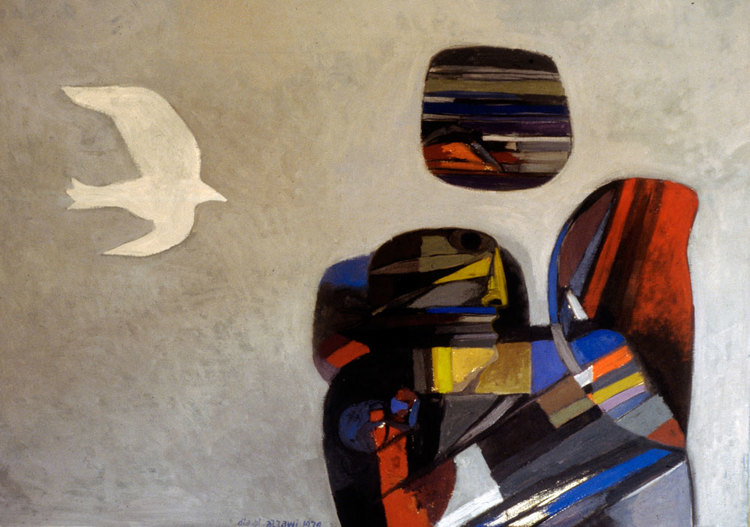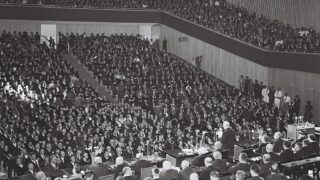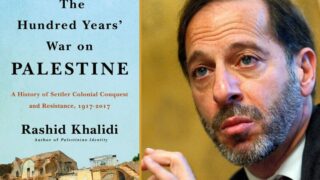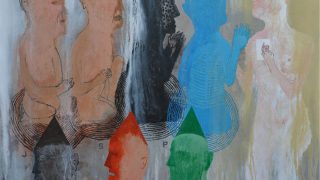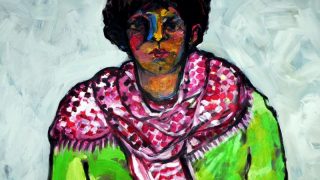A disgruntled father returns home from a hard day of work. Joining him for dinner are a radio in one hand, a newspaper in another, and a television in the background. He enjoys his meal, but he cannot digest the news: bulletins of war, destruction, and defeat worsen his ulcer. For relief, he sips on boiling mint tea and sighs “Curse the Arabs! They are a failed people.” He concludes his meal with these words as religiously as his mother finishes hers with an amen. For the Arab reader, this should sound all too familiar. We all heard these words sitting around the dinner table as kids, and today, we repeat them as adults. In every station of life, whether we greet the living or we bury the dead, we curse our kind and our condition.
Growing up in occupied Palestine, I never really questioned this odd ritual, nor did I wonder why we, as Arabs, spent so much time cursing ourselves. These scenes seamlessly weaved into my childhood, alongside the food my mother prepared, the jasmine in the garden, and the filth in the streets.
With age, however, I became frustrated with this self-loathing that spanned generations. It reminded me of Bernard Lewis’ diagnosis of the Arab malaise, a diagnosis I disagreed with because it came from an observer that didn’t care at all for its cure. According to Lewis, an orientalist and a Zionist, Arab humiliation runs centuries deep. It goes back to the time it lost its glory to Western Christendom. But humiliation, I thought to myself, was historical and dynamic; it came through human action and can be reversed by it. It changes from generation to generation. So I sat down at the same dinner table, and pondered my father’s words: Why did he curse himself and his people? His words, I understood, were those of his generation that was humiliated by the defeats of war. He cursed the Arabs, because the Arabs promised something they could not deliver. That radio he obsessively held to his right ear once uttered speeches of progress and freedom. He read the newspapers with passion, because they made him feel like an agent of history—someone who made news, not only someone who read it. Today, his radio no longer promises anything, it simply relays defeat. My father has become a spectator to his own history, and the eight o’clock news gives him a front row seat to his people’s tragic fate.
What about us? What about my generation? Ours, I realized, is different. We didn’t grow up with the humiliations of war, but with the humiliations of peace. Our radios promised us a final agreement in the coming months, and a Palestinian state in the coming years, but we got neither. We lost a peace that was impossible to win, since it was designed to inflict defeat. But as young boys and girl, did we know this? How could we, when diplomats, statesmen, and a gigantic peace industry acted out daily spectacles of statehood and peace? These illusions fooled adults, and so they were bound to fool us. Our newspaper headlines now printed hyphens, rather than periods, between Israelis and Palestinians: Israeli-Palestinian football, Israeli-Palestinian orchestra, Israeli-Palestinian theatre … The more grandiose the hyphened illusion, the better. We saw members of our diaspora return, and we were even proud of our newly created “state” institutions. We knew of the warnings, we saw the Israelis settlements grow, but for a few years, these realities were dwarfed and silenced by the sounds of clarions that kept on promising peace.
It is difficult to imagine this now. With the hindsight of the Second Intifada, the multiple wars on the Gaza strip, and ongoing Israeli settler colonialism, it might be even grotesque to do so. However, it is an important realization. We are a generation humiliated by peace. The scars of our collective psyche were carved by pens, not only by swords. Peace—a word wished upon our guests—has now become a bitter insult in our mouths. Deep inside, this is the humiliation that fuels our struggle against normalization with Israelis, against Israeli tanks, soldiers, and police in Gaza, in the West Bank, in Jerusalem, in Haifa. The scar has not left us resigned, but empowered to diversify the struggle and fight for a future where peace is an enabler of justice, not an obstacle to it.
But as I write these words to nurture hope and to break free from the cycle of humiliation, I continue watching the news, observing the nihilism and chaos that surrounds us. I can’t help but wonder: when I sit at my kitchen table and have dinner with my future children, whom will I curse? And, God forbid, will my children one day curse me?

